- Home
- Robert Jordan
The Gathering Storm twot-12 Page 9
The Gathering Storm twot-12 Read online
Page 9
She had imagined herself undermining Elaida and seizing control of the White Tower from within. Now she realized that she didn't need to undermine Elaida. The woman was fully capable of doing that herself. Why, Egwene could picture the reaction of the Sitters and Ajah heads when Elaida announced her intention to change the Three Oaths!
Elaida would topple eventually, with or without Egwene's help. Egwene's duty, as Amyrlin, wasn't to speed that fall — but to do whatever she could to hold the Tower and its occupants together. They couldn't afford to fracture further. Her duty was to hold back the chaos and destruction that threatened them all, to reforge the Tower. As she finished off her soup, using the last piece of bread to wipe the remnants from the bowl, she realized she had to do whatever she could to be a strength to the sisters in the Tower. Time was growing very short. What was Rand doing to the world without guidance? When would the Seanchan attack to the north? They'd have to cut through Andor to get to Tar Valon, and what destruction would that cause? Surely she had some time to reforge the Tower before the attack came, but no moments to waste.
Egwene took her dish into the kitchen proper and washed it herself, earning a nod of approval from the hefty Mistress of the Kitchens. After that, Egwene made her way up to Silviana's study. She needed to get her punishment done quickly; she still intended to visit Leane tonight, as was her custom. Egwene knocked, then entered, finding Silviana at her desk, leafing through a thick tome by the light of two silver lamps. When Egwene entered, Silviana marked the page with a small length of red cloth, then shut it. The worn cover read Meditations on the Kindling Flame, a history of the rise of various Amyrlins. Curious.
Egwene sat down on a stool before the desk — not flinching at the immediate sharp pain of her backside — and spoke calmly about the evening, omitting the fact that she'd dropped the bowl of soup on purpose. She did, however, say that she'd dropped it after Elaida had talked of revoking and changing the Three Oaths.
Silviana looked very thoughtful at that.
"Well," the woman said, standing up and fetching her lash, "the Amyrlin has spoken."
"Yes, I have," Egwene said, standing up and positioning herself on the table, skirts and shift up for the beating.
Silviana hesitated, and then the strapping began. Oddly, Egwene felt no desire to cry out. It hurt, of course, but she just couldn't scream. How ridiculous the punishment was!
She remembered her pain at seeing the sisters pass in the hallways, regarding one another with fear, suspicion and distrust. She remembered the agony of serving Elaida while holding her tongue. And she remembered the sheer horror at the idea of everyone in the Tower being bound by oath to obey such a tyrant.
Egwene remembered her pity for poor Meidani. No sister should be treated in such a way. Imprisonment was one thing. But beating a woman down, toying with her, hinting at the torture to come? It was insufferable.
Each of these things was a pain inside of Egwene, a knife to the chest, piercing the heart. As the beating continued, she realized that nothing they could do to her body would ever compare to the pain of soul she felt at seeing the White Tower suffer beneath Elaida's hand. Compared with those internal agonies, the beating was ridiculous.
And so she began to laugh.
It wasn't a forced laugh. It wasn't a defiant laugh. It was the laughter of disbelief. Of incredulity. How could they think that beating her would solve anything? It was ludicrous!
The lashing stopped. Egwene turned. Surely that wasn't all of it!
Silviana was regarding her with a concerned expression. "Child?" she asked. "Are you all right?"
"I am quite well."
"You . . . are certain? How are your thoughts?"
She thinks I've broken under the strain, Egwene realized. She beats me and I laugh from it.
"My thoughts are well," Egwene said. "I don't laugh because I've been broken, Silviana. I laugh because it is absurd to beat me."
The woman's expression darkened.
"Can't you see it?" Egwene asked. "Don't you feel the pain? The agony of watching the Tower crumble around you? Could any beating compare to that?"
Silviana did not respond.
I understand, Egwene thought. / didn't realize what the Aiel did. I assumed that I just had to be harder, and that was what would teach me to laugh at pain. But it's not hardness at all. It's not strength that makes me laugh. It's understanding.
To let the Tower fall, to let the Aes Sedai fail — the pain of that would destroy her. She had to stop it, for she was the Amyrlin Seat.
"I cannot refuse to punish you," Silviana said. "You realize that."
"Of course," Egwene said. "But please remind me of something. What was it you said about Shemerin? Why was it Elaida got away with taking the shawl from her?"
"It was because Shemerin accepted it," Silviana replied. "She treated herself as if she really had lost the shawl. She didn't fight back."
"I will not make the same mistake, Silviana. Elaida can say whatever she wants. But that doesn't change who I am, or who any of us are. Even if she tries to change the Three Oaths, there will be those who resist, who hold to what is correct. And so, when you beat me, you beat the Amyrlin Seat. And that should be amusing enough to make us both laugh."
The punishment continued, and Egwene embraced the pain, took it into herself, and judged it insignificant, impatient for the punishment to cease.
She had a lot of work to do.
CHAPTER 3
The Ways of Honor
Aviendha crouched with her spear-sisters and some True Blood scouts atop the low, grassy hill, looking down at the refugees. They were a sorry lot, these Domani wetlanders, with dirtied faces that had not seen a sweat tent in months, their emaciated children too hungry to cry. One sad mule pulled a single cart among the hundred struggling people; what they hadn't piled in the vehicle they carried. There wasn't much of either. They plodded northeast along a pathway that couldn't quite be called a road. Perhaps there was a village in that direction. Perhaps they were just fleeing the uncertainty of the coastal lands.
The hilly landscape was open save for the occasional stand of trees. The refugees hadn't seen Aviendha and her companions, despite the fact that they were less than a hundred paces away. She'd never understood how wetlanders could be so blind. Didn't they watch, noting any oddities on the horizon? Couldn't they see that traveling so near to a hilltop practically invited scouts to spy on them? They should have secured the hill with their own scouts before coming anywhere near.
Didn't they care? Aviendha shivered. How could you not care about eyes watching you, eyes that might belong to a man or Maiden holding a spear? Were they so eager to wake from the dream? Aviendha did not fear death, but there was a very big difference between embracing death and wishing for it.
Cities, she thought, they're the problem. Cities wete stinking, festering places, like sores that never healed. Some were better than others — Elayne did an admirable job with Caemlyn — but the best of them gathered too many people and taught them to grow comfortable staying in one place. If those refugees had been accustomed to travel and had learned to use their own feet, rather than relying on horses as wetlanders so often did, then it would not be so difficult for them to leave their towns. Among the Aiel, the craftsmen were trained to defend themselves, the children could live off the land for days, and even blacksmiths could travel great distances quickly. An entire sept could be on the move within an hour, carrying everything they needed on their backs.
Wetlanders were strange, doubtless. Still, she felt pity for the refugees. The emotion surprised her. While she was not heartless, her duty lay elsewhere, with Rand al'Thor. She had no reason to feel heartsore for a group of wetlanders she'd never met. But time spent with her first-sister, Elayne Trakand, had taught her that not all wetlanders were soft and weak. Just most of them. There was/7 in caring for those who could not care for themselves.
Watching these refugees, Aviendha tried to see them as Elayne would, but she
still struggled to understand Elayne's form of leadership. It was not the simple leadership of a group of Maidens on a raid — that was both instinctive and efficient. Elayne would not watch these refugees for signs of danger or hidden soldiers. Elayne would feel a responsibility to them, even if they were not of her own people. She would find a way to send food, perhaps use her troops to secure a safe area for them to homestead — and in doing so, acquire a piece of this country for herself.
Once, Aviendha would have left these thoughts to clan chiefs and roofmistresses. But she wasn't a Maiden any longer, and she had accepted that. She now lived under a different roof. She was ashamed that she had resisted the change for so long.
But that left her with a problem. What honor was there for her now? No longer a Maiden, not quite a Wise One. Her entire identity had been wrapped up in those spears, her self forged into their steel as surely as the carbon that strengthened them. She had grown from childhood certain that she would be Far Dareis Mai. Indeed, she had joined the Maidens as soon as possible. She had been proud of her life and of her spear-sisters. She would have served her clan and sept until the day when she finally fell to the spear, bleeding her last water onto the parched earth of the Three-fold Land.
This was not the Three-fold Land, and she had heard some algai'd'siswai wonder if the Aiel would ever return there. Their lives had changed. She didn't trust change. It couldn't be spotted or stabbed; it was more silent than any scout, more deadly than any assassin. No, she'd never trust it, but she would accept it. She would learn Elayne's ways and how to think like a chief.
She would find honor in her new life. Somehow.
"They are no threat," whispered Heirn, crouching with the True Bloods on the other side of the Maidens.
Rhuarc watched the refugees, alert. "The dead walk," the Taardad clan chief said, "and men fall at random to Sightblinder's evil, their blood corrupted like the water of a bad well. Those might be poor folk fleeing the ravages of war. Or they might be something else. We keep our distance."
Aviendha glanced at the increasingly distant line of refugees. She did not think Rhuarc was right; these were not ghosts or monsters. There was always something . . . wrong about those. They left her with an itch, as if she were about to be attacked.
Still, Rhuarc was wise. One learned to be careful in the Three-fold Land, where a tiny twig could kill. The group of Aiel slipped off the hilltop and down onto the brown-grassed plain beyond. Even after months spent in the wetlands, Aviendha found the landscape strange. Trees here were tall and long-limbed, with too many buds. When the Aiel crossed patches of yellow spring grass among the fallen winter leaves, they all seemed so full of water that she half-expected the blades and leaves to burst beneath her feet. She knew the wetlanders said that this spring was unnaturally slow starting, but already it was more fertile than her homeland.
In the Three-fold Land, this meadow — with the hills to provide watchpoints and shelter — would have immediately been seized by a sept and used for farming. Here, it was just one of a thousand different untouched patches of land. The fault lay again in those cities. The nearest ones were too distant from this location to make it a good spot for a wet-lander farmstead.
The eight Aiel quickly crossed the grasses, weaving between hillsides, moving with speed and stealth. Horses could not match a man's feet, what with their thunderous galloping. Terrible beasts — why did the wetlanders insist on riding them? Baffling. Aviendha could begin to understand how a chief or queen must think, but she knew that she'd never completely understand wetlanders. They were just too strange. Even Rand al'Thor.
Especially Rand al'Thor. She smiled, thinking of his earnest eyes. She remembered the scent of him — wetlander soaps, which smelled of oil, mixed with that particular earthy musk that was all his own. She would marry him. She was as determined as Elayne in that regard; now that they were first-sisters, they could marry him together as was proper. Only, how could Aviendha marry anyone, now? Her honor had been in her spears, but Rand al'Thor now wore those at his waist, beaten and forged into a belt buckle, given to him by her own hand.
He had offered her marriage once. A man! Offering marriage! Another of those strange wetlander customs. Even disregarding the strangeness of it — disregarding the insult his proposal had shown Elayne — Aviendha could never have accepted Rand al'Thor as her husband. Couldn't he understand that a woman must bring honor to a marriage? What could a mere apprentice offer? Would he have her come to him as an inferior? It would shame her completely to do that!
He must not have understood. She did not think him cruel, only dense. She would come to him when she was ready, then lay the bridal wreath at his feet. And she couldn't do that until she knew who she was.
The ways of ji'e'toh were complex. Aviendha knew how to measure honor as a Maiden, but Wise Ones were different creatures entirely. She had thought she was gaining some small amount of honor in their eyes. They had allowed her, for instance, to spend a great deal of time with her first-sister in Caemlyn. But then, suddenly, Dorindha and Nadere had arrived and informed Aviendha that she had been ignoring her training. They had seized her like a child caught listening furtively outside the sweat tent, towing her away to join the rest of her clan as they left for Arad Doman.
And now . . . and now the Wise Ones treated her with less respect than they had before! They offered her no teaching. Somehow, she had misstepped in their eyes. That made her stomach twist. To shame herself before the other Wise Ones was almost as bad as showing fear before one as brave as Elayne!
So far, the Wise Ones had allowed Aviendha some honor by letting her serve punishments, but she didn't know how she had shamed herself in the first place. Asking would — of course — only bring more shame. Until she unwove the problem, she could not meet her toh. Worse, there was a real danger of her making the mistake again. Until she sorted out this problem, she would remain an apprentice, and she would never be able to bring an honorable bridal wreath to Rand al'Thor.
Aviendha gritted her teeth. Another woman might have wept, but what good would that have done? Whatever her mistake, she had brought it upon herself, and it was her duty to right it. She would find honor again and she would marry Rand al'Thor before he died at the Last Battle.
That meant that whatever it was she had to learn, she needed to do so quickly. Very quickly.
They met up with another group of Aiel waiting in a small clearing amid a stand of pine trees. The ground was thick with discarded brown needles, the sky broken by the towering trunks. The group was small by the standards of clans and septs, barely two hundred people. In the middle of the clearing stood four Wise Ones, each wearing the characteristic brown woolen skirt and white blouse. Aviendha wore similar attire, which now felt as natural to her as the cadin'sor once had. The scouting party split up, men and Maidens moving to join members of their clans or societies. Rhuarc joined the Wise Ones, and Aviendha followed him.
Each of the Wise Ones — Amys, Bair, Melaine, and Nadere — gave her a glance. Bair, the only Aiel with the group who wasn't Taardad or Goshien, had arrived only recently, perhaps to coordinate with the others. Whatever the reason, none of them seemed pleased. Aviendha hesitated. If she left now, would it seem as if she were trying to avoid their attention? Did she instead dare stay, and risk incurring their further displeasure?
"Well?" Amys said to Rhuarc. Though Amys had white hair, she looked quite young. In her case, this wasn't due to working the Power — her hair had started turning silver when she'd been a child.
"It was as the scouts described, shade of my heart," Rhuarc said. "Another pitiful band of wetlander refugees. I saw no hidden danger in them."
The Wise Ones nodded, as if this was what they had expected. "That is the tenth band of refugees in less than a week," said aged Bair, her watery blue eyes thoughtful.
Rhuarc nodded. "There are rumors of Seanchan attacks on harbors to the west. Perhaps the people move inland to avoid the raids." He glanced at Amys. "This country boi
ls like water spilled on a hearthstone. The clans are uncertain what Rand al'Thor wishes of them."
"He was very clear," Bair noted. "He will be pleased that you and Dobraine Taborwin secured Bandar Eban, as he asked."
Rhuarc nodded. "But still, his intentions are not clear. He asked for us to restore order. Are we then to be like wetlander city guardsmen? That is no place for the Aiel. We are not to conquer, so we do not get the fifth.
And yet it feels very much like conquest, what we do. The Car'a'carns orders can be clear yet confusing at the same time. He has a gift in that area, I think."
Bair smiled, nodding. "Perhaps he intends for us to do something with these refugees."
"And what would we do?" Amys asked, shaking her head. "Are we Shaido, expected to make gai'sbain from wetlanders?" Her tone left little doubt as to what she thought of both Shaido and the idea of making wet-landers gai'sbain.
Aviendha nodded in agreement. As Rhuarc said, the Car'a'carn had sent them to Arad Doman to "restore order." But that was a wetlander concept; Aiel brought their own order with them. There was chaos to war and battle, true, but each and every Aiel understood his place, and would act within that place. The little children understood honor and toh, and a hold would continue to function after all of the leaders and Wise Ones were killed.
It was not so with wetlanders. They ran about like a basket of wild lizards suddenly dropped onto hot stones, taking no care for provisions when they fled. As soon as their leaders were occupied or distracted, banditry and chaos ruled. The strong took from the weak, and even blacksmiths were not safe.
What could Rand al'Thor expect the Aiel to do about it? They could not teach ji'e'tob to an entire nation. Rand al'Thor had told them to avoid killing Domani troops. But those troops — often corrupt and turned to banditry themselves — were part of the problem.
"Perhaps he will explain more when we arrive at this manor house of his," said Melaine, shaking her head, red-gold hair catching the light. Her pregnancy was just beginning to show beneath her Wise One blouse. "And if he does not, then surely it is better for us to be here in Arad Doman than to spend yet more time lounging back in the land of the treekillers."

 Conan the Unconquered
Conan the Unconquered Conan the Triumphant
Conan the Triumphant The Eye of the World
The Eye of the World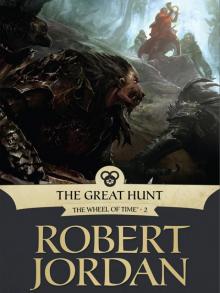 The Great Hunt
The Great Hunt Conan the Victorious
Conan the Victorious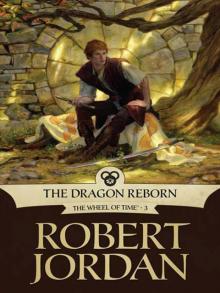 The Dragon Reborn
The Dragon Reborn The Fires of Heaven
The Fires of Heaven Winter's Heart
Winter's Heart Lord of Chaos
Lord of Chaos The Shadow Rising
The Shadow Rising Conan the Defender
Conan the Defender The Strike at Shayol Ghul
The Strike at Shayol Ghul The Path of Daggers
The Path of Daggers A Memory of Light
A Memory of Light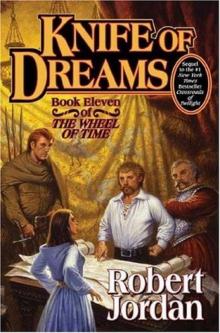 Knife of Dreams
Knife of Dreams Crossroads of Twilight
Crossroads of Twilight Conan the Invincible
Conan the Invincible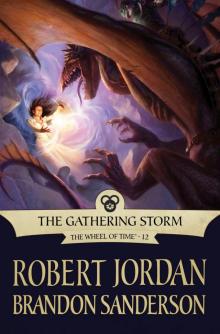 The Gathering Storm
The Gathering Storm Warrior of the Altaii
Warrior of the Altaii A Crown of Swords
A Crown of Swords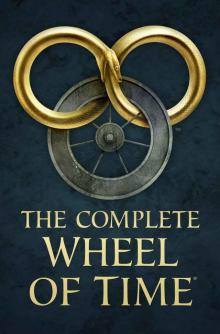 The Wheel of Time
The Wheel of Time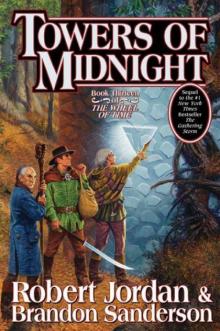 Towers of Midnight
Towers of Midnight Conan Chronicles 2
Conan Chronicles 2 Conan the Magnificent
Conan the Magnificent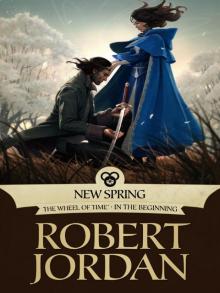 New Spring
New Spring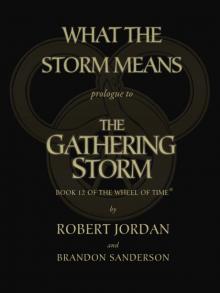 What the Storm Means
What the Storm Means A Memory of Light twot-14
A Memory of Light twot-14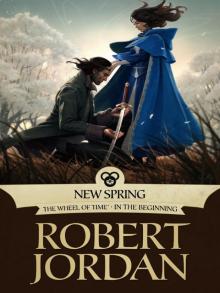 New Spring: The Novel
New Spring: The Novel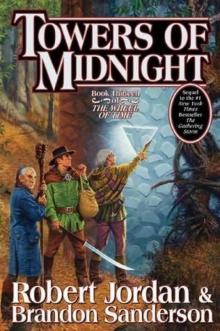 Towers of midnight wot-13
Towers of midnight wot-13 A Memory Of Light: Wheel of Time Book 14
A Memory Of Light: Wheel of Time Book 14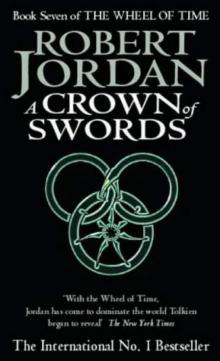 A Crown of Swords twot-7
A Crown of Swords twot-7 Lord of Chaos twot-6
Lord of Chaos twot-6 The Great Hunt twot-2
The Great Hunt twot-2 The Shadow Rising twot-4
The Shadow Rising twot-4![Wheel of Time-11] Knife of Dreams Read online](http://i1.bookreadfree.com/i1/04/03/wheel_of_time-11_knife_of_dreams_preview.jpg) Wheel of Time-11] Knife of Dreams
Wheel of Time-11] Knife of Dreams The Dragon Reborn twot-3
The Dragon Reborn twot-3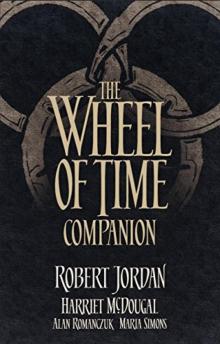 The Wheel of Time Companion
The Wheel of Time Companion The Fires of Heaven twot-5
The Fires of Heaven twot-5 Prologue to Towers of Midnight
Prologue to Towers of Midnight The Path of Daggers - The Wheel of Time Book 8
The Path of Daggers - The Wheel of Time Book 8 The Path of Daggers twot-8
The Path of Daggers twot-8 By Grace and Banners Fallen: Prologue to a Memory of Light
By Grace and Banners Fallen: Prologue to a Memory of Light Crossroads of Twilight twot-10
Crossroads of Twilight twot-10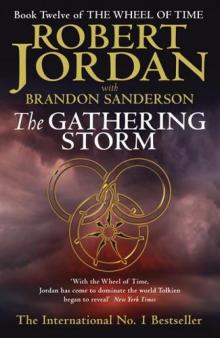 The Gathering Storm twot-12
The Gathering Storm twot-12 Winter's Heart twot-9
Winter's Heart twot-9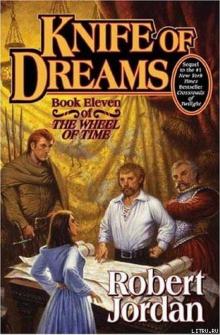 Knife of Dreams twot-11
Knife of Dreams twot-11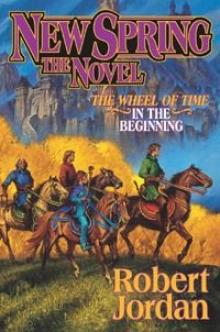 New Spring: The Novel (wheel of time)
New Spring: The Novel (wheel of time)